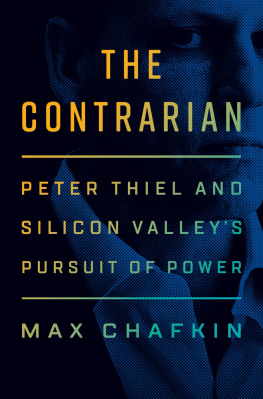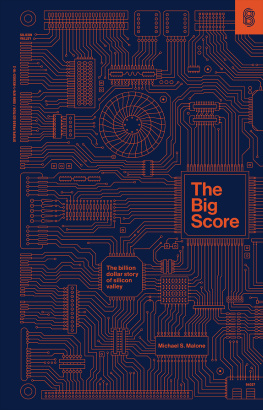Contents
Guide
Pagebreaks of the print version
The author and publisher have provided this e-book to you for your personal use only. You may not make this e-book publicly available in any way. Copyright infringement is against the law. If you believe the copy of this e-book you are reading infringes on the authors copyright, please notify the publisher at: us.macmillanusa.com/piracy.
Depending on whom you ask, it was either the apex, the inflection point, or the beginning of the end for Silicon Valleys startup scenewhat cynics called a bubble, optimists called the future, and my future coworkers, high on the fumes of world-historical potential, breathlessly called the ecosystem. A social network everyone said they hated but no one could stop logging in to went public at a valuation of one-hundred-odd billion dollars, its grinning founder ringing the opening bell over video chat, a death knell for affordable rent in San Francisco. Two hundred million people signed on to a microblogging platform that helped them feel close to celebrities and other strangers theyd loathe in real life. Artificial intelligence and virtual reality were coming into vogue, again. Self-driving cars were considered inevitable. Everything was moving to mobile. Everything was up in the cloud. The cloud was an unmarked data center in the middle of Texas or Cork or Bavaria, but nobody cared. Everyone trusted it anyway.
It was a year of new optimism: the optimism of no hurdles, no limits, no bad ideas. The optimism of capital, power, and opportunity. Wherever money changed hands, enterprising technologists and MBAs were bound to follow. The word disruption proliferated, and everything was ripe for or vulnerable to it: sheet music, tuxedo rentals, home cooking, home buying, wedding planning, banking, shaving, credit lines, dry cleaning, the rhythm method. A website that allowed people to rent out their unused driveways raised four million dollars from elite firms on Sand Hill Road. A website taking on the kennel marketa pet-sitting and dog-walking app that disrupted neighborhood twelve-year-oldsraised ten million. An app for coupon-clipping enabled an untold number of bored and curious urbanites to pay for services they never knew they needed, and for a while people were mainlining antiwrinkle toxins, taking trapeze lessons, and bleaching their assholes, just because they could do it at a discount.
It was the dawn of the era of the unicorns: startups valued, by their investors, at over a billion dollars. A prominent venture capitalist had declared in the op-ed pages of an international business newspaper that software was eating the world, a claim that was subsequently cited in countless pitch decks and press releases and job listings as if it were proof of somethingas if it were not just a clumsy and unpoetic metaphor, but evidence.
Outside of Silicon Valley, there seemed to be an overall resistance to taking any of it too seriously. There was a prevailing sentiment that, just like the last bubble, this would eventually pass. Meanwhile, the industry expanded beyond the province of futurists and hardware enthusiasts, and settled into its new role as the scaffolding of everyday life.
Not that I was aware of any of thisnot that I was paying any attention at all. I didnt even have apps on my phone. I had just turned twenty-five and was living on the edge of Brooklyn with a roommate I hardly knew, in an apartment filled with so much secondhand furniture it almost had a connection to history. I had a fragile but agreeable life: a job as an assistant at a small literary agency in Manhattan; a smattering of beloved friends on whom I exercised my social anxiety, primarily by avoiding them.
But the corners seemed to be coming up. The wheels were coming off. I thought, every day, about applying to graduate school. My job was running its course. There was no room to grow, and after three years the voyeuristic thrill of answering someone elses phone had worn thin. I no longer wanted to amuse myself with submissions from the slush pile, or continue filing author contracts and royalty statements in places where they did not belong, like my desk drawer. My freelance work, proofreading and copyediting manuscripts for a small press, was also waning in volume, because I had recently broken up with the editor who assigned it to me. The relationship had been stressful, but reliably consuming: the editor, several years my senior, had talked about marriage but wouldnt stop cheating. These infidelities were revealed after he borrowed my laptop for a weekend and returned it without logging out of his accounts, where I read a series of romantic and brooding private messages he exchanged with a voluptuous folk singer via the social network everyone hated. That year, I hated it extra.
I was oblivious to Silicon Valley, and contentedly so. Its not that I was a LudditeI could point-and-click before I could read. I just never opened the business section. Like anyone else with a desk job, I spent the majority of my waking hours peering into a computer, typing and tabbing through the days, the web browser a current of digital digression running beneath my work. At home, I wasted time scrolling through the photos and errant musings of people I should have long since forgotten, and exchanged endless, searching emails with friends, in which we swapped inexpert professional and dating advice. I read the online archives of literary magazines that no longer existed, digitally window-shopped for clothing I could not afford, and created and abandoned private, aspirational blogs with names like A Meaningful Life, in the vain hope that they might push me closer to leading one. Still, it never occurred to me that I might someday become one of the people working behind the internet, because I had never considered that there were people behind the internet at all.
In the manner of so many twentysomethings living in North Brooklyn at a time when an artisanal chocolate factory was considered a local landmark and people spoke earnestly about urban homesteading, my life was affectedly analog. I took photographs with an old, medium-format camera that had belonged to my grandfather, then scanned those photographs into my dying laptop, its internal fan whirring, to upload to my blogs. I sat atop busted amplifiers and cold radiators in Bushwick practice spaces, paging through back issues of prestige magazines, watching various crushes suck on hand-rolled cigarettes and finger their drumsticks and slide guitars, listening attentively to their noodling in preparation for my feedback to be solicited, though it never was. I went on dates with men who made chapbooks or live-edge wood furniture; one identified as an experimental baker. My to-do list always included archaic chores like buying a new needle for the record player I rarely used or a battery for the watch I never remembered to wear. I refused to own a microwave.
Insofar as I considered the technology industry of any importance to my own life, it was only because of circulating concerns specific to my professional world. An online superstore that had gotten its start in the nineties by selling books on the World Wide Webnot because the founder had a love of literature, but because he had a love of consumers, and consumptive efficiencyhad expanded to become a digital bargain basement dealing in appliances, electronics, groceries, mass fashion, childrens toys, cutlery, and various nonnecessities manufactured in China. Having conquered the rest of retail, the online superstore had returned to its roots and seemed to be experimenting with various ways to destroy the publishing industry. It had even gone so far as to start its own publishing imprints, which my literary friends scorned and derided as cheesy and shameless. We ignored the fact that we had many reasons to be grateful to the website, as the publishing industry was being kept afloat by bestselling novels about sadomasochism and vampires who fucked, hatched in the incubator of the online superstores marketplace for self-published e-books. Within a few years, the founder, a chelonian exhedge funder, would become the wealthiest person in the world and undergo a montage-worthy makeover, but at the time we werent thinking about him. All that mattered to us was that the site was responsible for half of all book sales, which meant it had wrested control of the most important levers: pricing and distribution. It had us in its grip.





